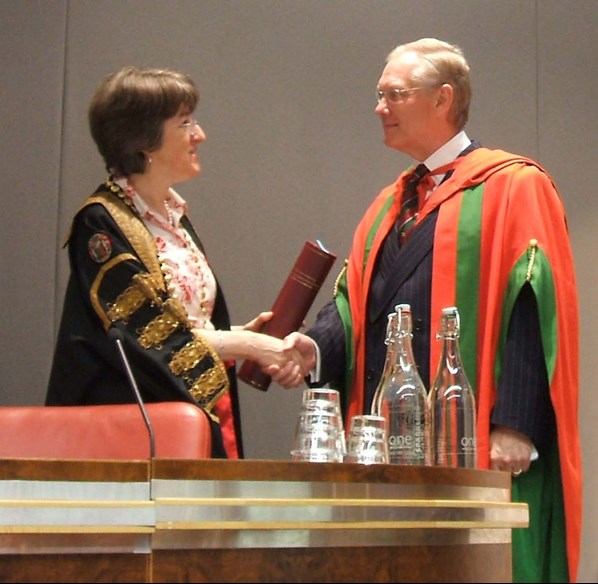
Obituary: Professor V. Craig Jordan
The Royal Society of Medicine (RSM) is deeply saddened to learn of the death of RSM Honorary Fellow and former President of the RSM Foundation, Professor V. Craig Jordan CMG, OBE, PhD, DSc, FMedSci.
Professor Jordan, a pharmacologist passed away in June aged 76, from complications arising from kidney cancer, seven years after being diagnosed. He leaves behind a formidable legacy thanks to his pioneering research into selective estrogen (oestrogen) receptor modulators (SERMs), most famously tamoxifen, a selective oestrogen receptor modulator used to prevent and treat breast cancer.
Today, there are 5-FDA approved SERMs (tamoxifen, raloxifene, toremifene, basedoxifene, ospemiphene) used to treat major diseases and conditions, from the treatment of all stages of breast cancer, to breast cancer risk reduction in high-risk cases, osteoporosis, painful intercourse, and menopausal symptoms in women. The clinical success of Jordan’s SERM discovery stimulated the discovery and application of selective nuclear receptor modulators.
Born in 1947 in Texas with dual US and UK nationality, Jordan moved to the UK as a child. His early beginnings in Bramhall, Cheshire did nothing to suggest the huge impact he would go on to have. Recounting his life story to the RSM in 2022, he remembers school being a challenge:
“Although I passed the entrance exam to get into grammar school, I struggled academically. I had one passion though, and that was chemistry. My mother let me convert my bedroom into a real laboratory and it was fit for use to do anything, including setting the curtains on fire on one occasion.
“I was heading for a career as a chemistry technician in the pharmaceutical industry but my headteacher gave me the chance to stay on in the sixth form to get the A’ levels I needed to study pharmacology at the University of Leeds.”
After completing his undergraduate degree at Leeds, Jordan received a scholarship from the Medical Research Council to undertake a PhD, also at the University of Leeds. It was while studying for his doctorate that his lifelong fascination with oestrogen receptors was born.
“When I first began researching tamoxifen it was being used to treat end-stage breast cancer. It worked only for a year or two in treatment of advanced disease before the patients died. Because there were no side effects compared with cytotoxic chemotherapy, questions were raised about its effectiveness.
“I was convinced that long-term treatment with tamoxifen would work to prevent further disease in women with micro-metastatic breast cancer, which was normally treated with mastectomy followed by chemotherapy.
“It was a fight to get my research rationale accepted because of the one-dimensional idea at the time that tamoxifen should be given as a short-term treatment. I’d go to meetings to talk about tamoxifen and people would ask how I knew it worked when it didn’t have any side effects. But I was able to show in animal data that the long-term approach worked.
“My approach was proven when the results of an Edinburgh clinical trial, published by The Lancet in 1987, showed that long-term tamoxifen treatment for five years kept people alive.”
Professor Jordan went on to hold a number of positions in both the US and UK, and was honoured with some of the highest awards, including being made a Companion of the Order of St Michael and St George (CMG) in the 2019 Birthday Honours for services to women's health by Her Majesty Queen Elizabeth II.
In 2008, Professor Jordan’s services to the medical profession were recognised by the RSM, with the then President of the Royal Society of Medicine, Professor Ilora Finlay, Baroness Finlay of Llandaff, awarding him an Honorary Fellowship. He delivered the Jephcott Lecture at the RSM on the topic of 'Oestrogen action and the life or death of breast cancer' in 2009.

Professor Jordan accepting his Honorary Fellowship from Professor Ilora Finlay, Baroness Finlay of Llandaff.
Professor Jordan said he always thought of the Society as a home: “Especially when I’m greeted so warmly by the staff when I walk through the door.
“I got involved with the RSM primarily through the good offices of the late Professor Alan Roberts, who I first met when he was a major in the army reserves and I was an officer cadet at the University of Leeds Officer Training School.
“Many years later, Alan wrote to me after I received my honorary degree for humanitarian research from the University of Leeds and a great friendship was forged which lasted throughout the ten years I spent as President of the RSM Foundation in the USA, right up until his untimely death late last year.”
Nearly 40 years on from its discovery, tamoxifen continues to be a hugely important medication for both the treatment and prevention of breast cancer, and its impact will be felt for many more years to come. But Professor Jordan will also be remembered for his commitment and dedication to supporting causes close to his heart, and doing everything he could to enable future generations to be afforded the opportunity to make further scientific gains by supporting societies that aided him in his life and career.
“If it hadn’t been for my school and university education and grants from the Medical Research Council and other organisations, I wouldn’t be doing what I’m doing now and this has instilled a strong sense of public service. Repaying society for the opportunities I’ve been offered is important and I am pleased to have served in the British Army both in the UK and the US. I’ve also invested in universities, mostly at the University of Leeds by funding prizes and paying the fees for numerous talented intercalating medics over the decades, and also sponsoring lectureships at the universities of Wisconsin and Oxford.”
Thank you, Professor V. Craig Jordan, for your services to healthcare.
Professor V. Craig Jordan is survived by his two daughters. You can read more about his life and work in his autobiography, ‘Tamoxifen Tales. Suggestions for Scientific Survival’.
